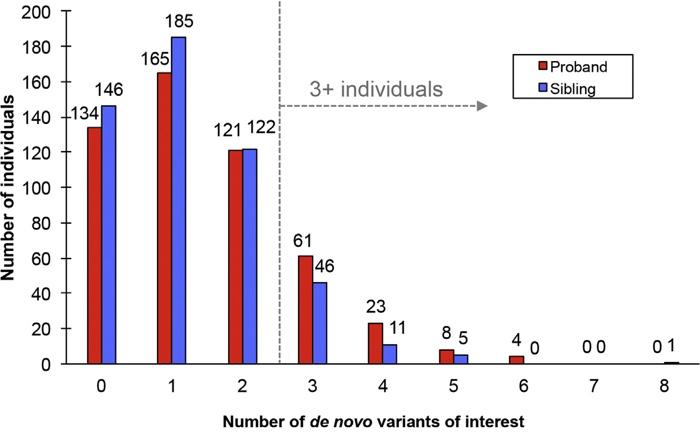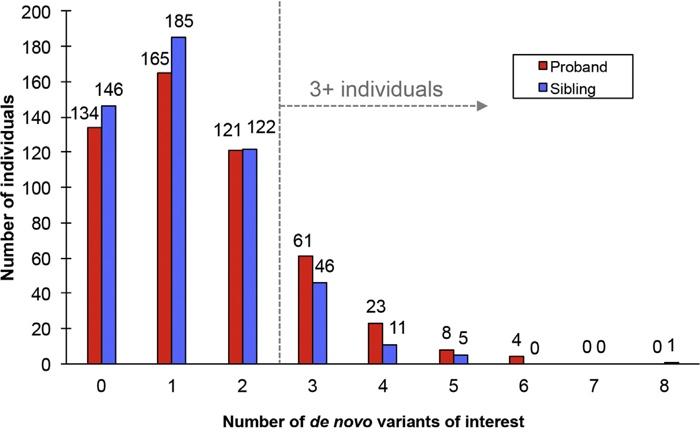
Credit: Turner et al./Cell 2017
Autism has genetic roots, but most cases can't be explained by current genetic tests.
Now, patterns found in autistic children's genomes – the complete set of genetic instructions inside cells – have revealed a new genetic signature for the disorder. The signature helps explain cases that don't have other genetic markers of autism.
The results, reported September 28, 2017, in the journal Cell, suggest that scanning a patient's entire genome could help researchers better understand the suite of genetic abnormalities underlying autism. If replicated, the findings could eventually help doctors diagnose the disorder, says study leader Evan Eichler, a Howard Hughes Medical Institute (HHMI) investigator at the University of Washington.
Whole genome sequencing, a technique that is rapidly becoming more affordable and available, provides a patient's complete genetic information. "In five to 10 years, whole genome sequencing could be the most informative tool for autism diagnosis," Eichler says.
Current genetic tests for autism scan broad portions of the genome for DNA insertions or deletions that have previously been linked to autism. Other tests look for changes in the DNA building blocks of certain genes. But these tests flag only about 10% to 30% of cases. Based on family histories, genetics plays a role in roughly 50% of autism cases.
To look for other genetic variations that might be unique to autism, Eichler and his colleagues wanted to examine a patient's entire set of genetic information.
Researchers at the New York Genome Center, including the center's former director, HHMI Investigator Robert Darnell, sequenced the genomes of 516 autistic children with no family history of autism, and no genetic anomalies detected by current tests. The researchers also sequenced the genomes of the children's parents and an unaffected sibling – 2,064 people in total. The genetic information is held in the Simons Simplex Collection research database.
Eichler and colleagues analyzed each family's data, looking for genetic variations that occurred only in children with autism. "With so many families to study, the effort was a massive undertaking that required two million hours of computer processing time," says Tychele Turner, a postdoctoral fellow in Eichler's lab. The team spent about a year analyzing the data, she says.
Eichler's team identified genetic changes that disrupted gene function and led to altered protein production, and genetic deletions too small to see with current tests. The researchers also found changes in areas of the genome that do not contain genes but are responsible for turning genes on. Eichler and colleagues marked all the changes in the Simons database so that others can use the findings as a resource, Turner says.
Then the researchers compared the number of variations in autistic children's genomes with that of their unaffected siblings. Children with autism were significantly more likely to have three or more different kinds of genetic variations, the team found. That suggests that a combination of sporadic genetic variations could contribute to autism, Eichler says. But he stresses that researchers need to replicate these findings in more families before specific genes or gene combinations are used for diagnosis.
Still, the idea that multiple genetic variations could lead to autism means researchers "need to dig deeper even on cases we think we've already solved," Eichler says. Whole genome sequencing could reveal additional genetic variations in children already diagnosed with the disorder.
###
Tychele N. Turner et al. "Genomic Patterns of De Novo Mutation in Simplex Autism," Cell. Published online September 28, 2017. doi: 10.1016/j.cell.2017.08.047
Media Contact
Meghan Rosen
[email protected]
301-215-8859
@HHMINEWS
http://www.hhmi.org
Original Source
https://www.hhmi.org/news/whole-genome-sequencing-identifies-new-genetic-signature-autism http://dx.doi.org/10.1016/j.cell.2017.08.047





